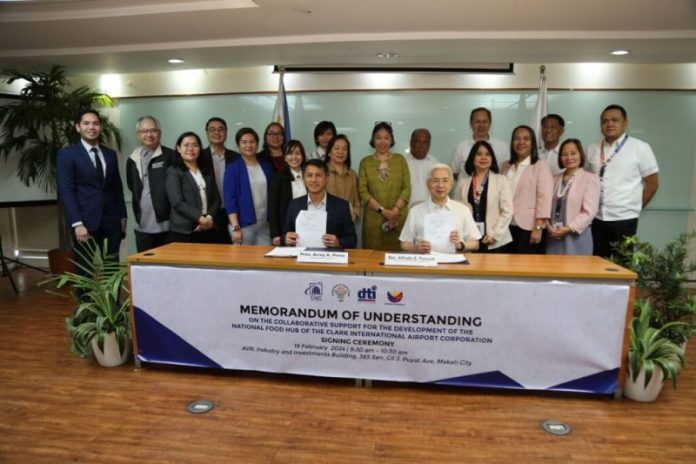
-
The departments of trade as well as agriculture signed an MOU with the Clark International Airport Corp. to develop a $152-million mega food hub in Clark City
-
The planned Clark National Food Hub actualizes the first strategy under DTI’s three-year food logistics action agenda, which is to revolutionize the food distribution network in the country from farm to fork
-
The food hub will be a 64-hectare agriculture trading center inside Clark Civil Aviation Complex
The Department of Trade and Industry (DTI) and the Department of Agriculture (DA) signed a memorandum of understanding with the Clark International Airport Corp. (CIAC) to develop a $152-million mega food hub in Clark City, Pampanga.
The planned Clark National Food Hub actualizes the first strategy under DTI’s three-year food logistics action agenda, which is to revolutionize the food distribution network in the country from farm to fork.
The three-year food logistics action agenda, approved by President Ferdinand Marcos, Jr. in August last year, is aimed at transforming the country’s food distribution system, reducing transport and logistics costs, and ensuring food supply chain efficiency.
READ: DTI’s 3-year food logistics agenda approved
The first of the six strategies seeks to establish food hubs outside of Metro Manila as aggregation points for fresh farm produce.
“This MOU will accelerate government’s efforts to make food available, accessible and more affordable to the consuming public,” Trade Secretary Alfredo Pascual said, adding that DTI expresses its full commitment to the initiative “given our two-pronged objectives to ensure logistics efficiency, and expand food exports.”
The Clark National Food Hub will be a 64-hectare agriculture trading hub inside the Clark Civil Aviation Complex (CCAC)—operated by CIAC—that will support the national government’s vision to make the Philippines a leading agricultural resource hub in the region and the world. The project is designed to be the Philippines’ premium wholesale market and distribution hub for quality produce.
Under the MOU signed on February 19, the DA will lead in the development of policy framework, public investment, and support services necessary for domestic and export-oriented businesses to support the overall goals of the National Food Hub. This includes sourcing the necessary budgets for the establishment or improvement of cold chain facilities and food terminals that will help expand the logistics network of the food hub.
DTI will provide assistance to encourage investments in the construction and management of the food hub, and is expected to play a big role in promoting market and logistics linkage between producers and institutional buyers.
Pascual said the PPP Center “has generously committed to provide the transaction advisory services to accelerate the feasibility study and bidding activities of the hub.” The United States Agency for International Development, through its Regulatory Reform Support Program for National Development Project, will also provide technical support.
Arrey Perez, CIAC president and chief executive officer, said they are “making much headway with the PPP Center in completing the project preparation stages, and working around the clock to identify key investors, major food conglomerates, and other private sector partners so we can break ground at the soonest possible time.”
He added that the food hub, in tandem with the CIAC’s six other flagship projects, “will be a game-changer for the Philippines’ overall agricultural productivity and the revitalization of our exports sector.”
Perez noted that Clark is an ideal site for the food hub because of its expansive space for infrastructure and facilities, and seamless road network connecting north, central and south Luzon to Clark International Airport (CRK) that is capable of handling cargoes.
CIAC manages the 2,367-hectare CCAC, home to CRK and as well as the mixed-use business district Clark Global City, and several locators in cargo and aviation-related businesses.




